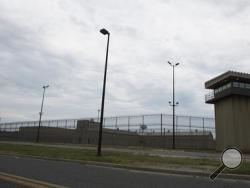BALTIMORE (AP) — A tip from a prison guard has yielded the single largest federal case in Maryland's history: 80 people including corrections officers, inmates and "outside facilitators" have been charged with orchestrating a vast contraband smuggling enterprise that traded drugs, tobacco and cellphones to prisoners for money and sex.
A pair of federal indictments unsealed Wednesday allege that a sweeping racketeering scheme at the Eastern Correctional Institution in Westover — Maryland's largest state prison — lasted years and involved 18 prison guards, 35 inmates and 27 civilians who helped coordinate the flow of drugs and other contraband.
Guards smuggled heroin, cocaine, MDMA, and Suboxone, among other narcotics, into the prison in exchange for cash, money orders and in some cases, sexual favors from inmates, the indictments alleged.
The court documents also saod guards smuggled the contraband past security screenings and delivered it to inmates in their cells or at pre-arranged "stash" sites such as laundry rooms and bathrooms. The indictments said the scheme involved smuggling at both the East and West compounds of the prison.
"Prison corruption is a longstanding, deeply rooted systemic problem that can only be solved by a combination of criminal prosecutions and policy changes," said U.S. Attorney Rod J. Rosenstein in a statement announcing the crackdown.
He added that those smuggling contraband were in a highly lucrative enterprise. According to the indictment, a single strip of Suboxone, a prescription opioid that sells for $3 on the street, could fetch up to $50 inside the prison. A $20 can of tobacco could go for $250.
Department of Public Safety and Correctional Services Secretary Stephen Moyer said he assigned eight investigators to work with the FBI and other federal agencies to crack the case, relying heavily on wiretaps.
Moyer said the indictments "send a strong message that we will no longer tolerate corruption committed by a few tarnishing the good work of our 10,500 dedicated and committed department employees."
According to the indictments, defendant correctional officers routinely warned inmates when prison administrators were planning to conduct cellphone searches.
In some cases, the documents say, when participating prison guards learned that inmates were giving administrators information, or "snitching," they would alert other inmates and encourage retaliation. Twice in July, prison guards encouraged inmates to stab other prisoners, Rosenstein said. Two inmates and two guards were charged with civil rights violations stemming from the attacks, he added.
Rosenstein said the investigation began in 2013 after a concerned corrections officer caught wind of the scheme and brought it to the attention of prison authorities. The local prosecutor, Moyer said, handed the case over to federal authorities. He added that the scheme was perpetrated not by managers, but mostly by low-level correctional officers.
The indictments follow a high-profile prison contraband scandal at the Baltimore City Detention Center in 2013 in which 44 people were federally indicted. Authorities aid that racketeering scheme's ringleader, Tavon White, who was also a known member of the Black Guerrilla Family gang, impregnated several prison guards and on a recorded telephone line famously told a friend on the outside, "This is my jail." White pleaded guilty to conspiracy charges and was sentenced to 12 years in prison after agreeing to testify against his co-defendants.
Maryland Gov. Larry Hogan, who was responsible for making the decision to close the Baltimore City Detention Center last year, said in a statement that his administration "has been and will remain steadfastly committed to stopping this kind of illicit behavior."

